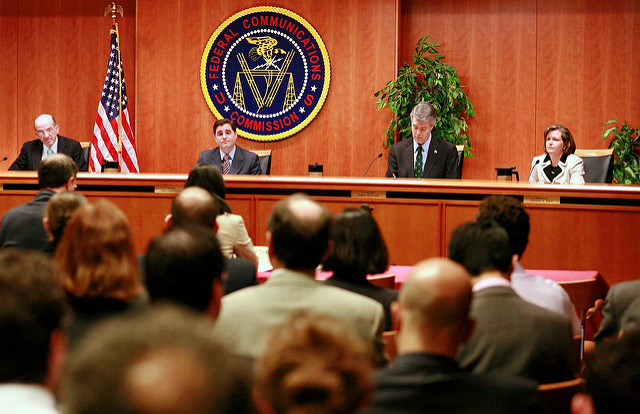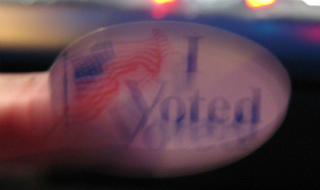GOP tells FCC to just stop what it’s doing until inauguration
by Jon Brodkin, Ars Technica

Republicans in Congress have urged the Federal Communications Commission to avoid passing any controversial regulations between now and Donald Trump’s inauguration as president. Read More ›
Big Win: FCC Adopts Landmark Internet Privacy Rules
On October 27, 2016, the Federal Communications Commission adopted privacy protections that place consumers in charge of the sharing of sensitive personal information by broadband Internet access providers. The rules, which are unprecedented in the United States, will stop Internet access providers from misusing customers’ browsing history, … Read More ›
FCC Adopts New Privacy Rule, Limits What ISPs Can Do With Your Data
by Kate Cox, The Consumerist

“Consumers should not have to be network engineers to understand who is collecting their data, and they should not have to be lawyers to understand if their information is protected. So it is incumbent upon every policy-maker with privacy authority to think about how to make our policies more simple and more consistent,” wrote Commissioner Jessica Rosenworcel. Read More ›
DeVry University Must Stop Claiming That 90% Of Grads Get Jobs
by Ashlee Kieler, The Consumerist

The settlement stems from a Department of Education request that the school provide data and other information to substantiate the 90% claim. After reviewing the information that DeVry provided, the Federal Student Aid office found that the school could not provide evidence to support the claims. Read More ›
These Are The Privacy Rules Your ISP Might Soon Have to Live By
by Brian Fung, Washington Post

Should the government impose new rules on Internet providers to protect your privacy online? That will be the subject of an Oct. 27 vote by the Federal Communications Commission, the nation’s top broadband regulator. Read More ›
CFC Applauds FCC Chairman Wheeler’s Broadband Privacy Proposal

The FCC Chairman’s proposal would prohibit Broadband Internet Access Service (BIAS) providers from sharing sensitive information without a consumer’s consent. The proposal also requires BIAS providers to inform consumers about what information they collect and with whom that information is shared. Read More ›
AT&T Stops Charging Broadband Users Extra For Privacy
by Karl Bode, TechDirt

While AT&T claims it’s just concerned about “simplicity,” the real reason is because the FCC is considering some basic privacy protections for broadband users, who often can’t vote against bad behavior with their wallet thanks to the lack of competition in the broadband space. Read More ›
CFC Announces Endorsements in November 2016 Legislative Races

Consumer Federation of California (CFC) has endorsed these candidates for election in November 2016: Assembly District 24: Vicki Veenker (D) Assembly District 27: Ash Kalra (D) Assembly District 65: Sharon Quirk-Silva (D) Senate District 3: Mariko Yamada (D) Senate District 15: Jim Beall (D) (Incumbent) The endorsements … Read More ›
CFPB Has Handled 1 Million Consumer Complaints

Five years in and a million complaints down. That is the story the CFPB is putting out today — since having been founded in 2011, the Consumer Finance Protection Bureau has handled over one million consumer complaints, a milestone they sailed past earlier this month. Read More ›
Even Generic Drug Prices Are Going Through The Roof
by Katie Gibson, CBS Moneywatch

Generic versions of popular or vital drugs have been a partial bright spot amid a public outcry over pharmaceutical companies jacking up the prices by astronomical proportions. But generic-drug manufacturers are also getting in on the price-hiking action. Read More ›
Save Social Security! Group Accused of Scams Targets N.J. Seniors
by Karin Price Mueller, NJ.com

A complaint-laden organization that solicits donations nationwide is making a play in New Jersey. The letter had many warning signs of a scam: telling the recipient to “rush,” saying the recipient had been “specially selected” and saying the mailing was “exclusive.” Read More ›
Wells Fargo To Pay $185 million Settlement For ‘Outrageous’ Sales Culture
by James Rufus Koren, Los Angeles Times

Calling it “outrageous” and “a major breach of trust,” local and federal regulators hammered Wells Fargo & Co. for a pervasive culture of aggressive sales goals that pushed thousands of workers to open as many as 2 million accounts that bank customers never wanted. Read More ›
Companies Wary of WhatsApp Privacy Issues
by Claire Atkinson, New York Post

It’s not just privacy advocates who are freaking out over Facebook’s decision to extract user data from its popular WhatsApp messaging service. The controversial move may force business to explore other avenues beyond Facebook and WhatsApp as a way to connect with consumers more securely. Read More ›